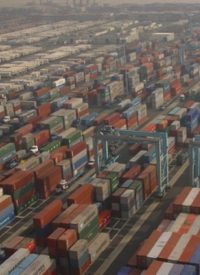
Despite opaque and dissembling arguments that what the world needs now is a world currency to replace the weakening dollar, there are significant obstacles confronting that elitist dream.
After the IMF (International Monetary Fund) annual meeting in Washington ended, leaders could only conclude that the IMF needed to keep “a close watch on currencies,” using “candor” and an “evenhanded” approach to such observations.
While departing amidst platitudes, the “leaders'” real issue is rising protectionism being waged by its members through currency manipulation. Simply put, in order to stimulate exports, a country will often resort to reducing the value of its currency in order to make goods offered for sale in foreign countries appear to be cheaper. By stimulating such export demand, local companies providing goods for export enjoy increasing sales and profits, and are then encouraged to expand, hiring more workers and purchasing more capital goods. Thus, in a static environment, and in the very short run, the local economy is stimulated.
The only problem is that most of the G-20 countries (including Argentina, Australia, Brazil, Canada, China, France, Germany, Japan, and others) have been engaging in these “beggar thy neighbor” policies for some time, setting the stage for a potential worldwide trade war. Steve Englander of Citigroup in New York said, “Policy makers seemed to be trying to diminish concerns about currency wars. There did not seem [to be] any commitment to change behavior, however. There is little to suggest that the dollar’s direction is anything but down.” At this writing, the dollar trades at 82 yen, the lowest since April, 1995. Treasury Secretary Timothy Geithner also expressed concern that “global rebalancing is not progressing as well as needed to avoid threats to the global economic recovery. Our initial achievements are at risk of being undermined by the limited extent of progress.” As explained by Simon Kennedy, writing for Bloomberg.com, “More and more economies are taking steps to spur growth that end up weakening their currencies…. While a lower exchange rate can help bolster exports, it also hurts trading partners, who may [then] look to regain advantage through their own [currency] devaluations or by erecting trade barriers.”
This smacks of repeating errors made during the Great Depression when the Smoot-Hawley Tariff Act was passed in 1930, which raised prices on over 20,000 goods in order to “protect” the American economy. Similar protectionist measures by other countries soon reduced total imports and exports by half. Nouriel Roubini, New York University professor, put it succinctly: “We’re in a world in which everyone wants a weaker currency but you cannot have equilibrium of all currencies being weaker. Currency-intervention wars eventually can lead to trade wars.”
Alex Newman explained in his “Waking Up to a World Currency” in The New American that such weakness in the American dollar is “prompting calls for a world currency to stabilize world financial markets.” Newman then reviews the ongoing efforts to replace, perhaps as soon as 2014, the dollar with an IMF currency. The head of the communist-China central bank, Zhou Xiaochuan, explained that “the desirable goal of reforming the international monetary system, therefore, is to create an international reserve currency that is disconnected from individual nations and is able to remain stable in the long run, thus removing the inherent deficiencies caused by using credit-based national currencies [like the dollar].”
The intent of the insiders to create a world currency just became even clearer, thanks to an article in the Wall Street Journal and analyzed by the Daily Bell. That article opens:
Three years ago, the International Monetary Fund was irrelevant, an object of derision for all opponents of globalization. Under director Dominique Strauss-Kahn … the IMF has since become more influential — governing like a global financial authority.
In an interview for that article, Strauss-Kahn was asked, “Does this mean that the IMF became the first post-crisis world government?”
No, no, the government has to consist of elected people, and that’s more like the G-20. But the reality is the G-20 — or any other grouping — doesn’t operate like a government….
In the end we aim at much more than just the right financial and economic policies. The ultimate goal, of course, is world peace through economic stability.
It just may be that protectionist self-interest expressed by the various members of the G-20, even though short-sighted, may delay the closing of the world currency loop in time for sensible, newly elected limited-government representatives in the United States to begin to put a stop to this push for a world currency and a concurrent world government. For the moment, at least, a world currency is no shoo-in.



